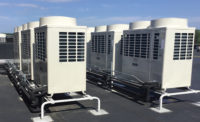
A VRF system installed in Guilford College’s
Archdale Hall not only met architectural challenges but also provided high A/C
performance.
Established by the Quakers in 1837, Guilford College is the third oldest co-ed college in the U.S. Archdale Hall was built in 1885 and named for John Archdale, a Quaker who served as the governor of North Carolina from 1694-96. A men’s dormitory for 80 years, the Hall was converted into faculty offices in 1965.
COMMITTED TO GREEN BUILDING
Jon Varnell, Guilford College’s associate vice president of operations and facilities, is part of the industry’s growing corps of facility managers committed to green building. With an interest in sustainable, eco-friendly solutions, Varnell was looking at options for renovating the oldest building on the 350-acre campus, Archdale Hall. His goal was to have the building achieve LEED® certification.In addition to frequent complaints from faculty (individual cooling and heating discomfort, noise, and IAQ), Varnell was unhappy with Archdale’s outdated 1950’s renovation which included soaring costs for energy inefficiencies.
Disappointed by advice from an initial LEED consultant, Varnell turned to a trusted partner in the HVAC business. After a tour of the old building, Varnell’s contact introduced him to multi-split variable refrigerant flow (VRF) technology. Mitsubishi’s zoned INVERTER-driven heat pump and heat recovery systems are designed to maximize individual comfort in separate zones and improve IAQ, as well as cutting energy costs by as much as 50%. Additionally, Varnell was told that the Mitsubishi Electric technology could help the project earn valuable credits toward LEED certification. Varnell toured several local VRF system installations, including a North Carolina State Trooper headquarters.
SEEKING LEED SILVER CERTIFICATION
To help implement the VRF zoning installation, Varnell turned to Spectrum Design, PC (Roanoke, VA), a firm known for environmentally friendly designs in education facilities.“We liked the Mitsubishi Electric system recommendation immediately,” said Mark Garland, Spectrum green building coordinator. “We soon learned that it was a great concept for Archdale Hall, an excellent choice for renovating old buildings. The Mitsubishi Electric installation contributed to 7 of the 39 points on the LEED-NC Version 2.2 Registered Project Checklist. Achieving Silver certification requires 33 to 38 points.”
Varnell understood every LEED certification is earned through a comprehensive review process administered by the USGBC. To qualify, Archdale Hall’s installed energy systems must first receive a third-party endorsement from a commissioning professional. Varnell hired Tom Foster, P.E., CBCP, LEED AP, founder of Commissioning WorCx (Jamestown, NC).
“This was my first experience with commissioning a VRF system,” Foster said. “I am very impressed with the performance of Mitsubishi Electric’s VRF zoning technology. The R2-Series system specified has solved every complaint from the faculty occupants of Archdale Hall. I also know that the Mitsubishi Electric system installation and equipment costs saved Guilford College a large six-figure price tag from a water-source heat pump system (with 12 wells) originally specified.”


